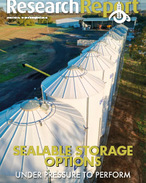This article is 8 years old. Images might not display.
The lesser loosestrife weed (Lythrum hyssopifolia), also known as Hyssop loosestrife, is widespread in the southern agricultural areas of Western Australia.
It is an upright, hard stemmed plant similar to rosemary that grows to 40cm in height and has tiny pink-lilac flowers. The plant toxin causes the liver and kidney damage to livestock, and the weed can cause significant mortalities in sheep, with one case already reported in the southern region this year.
Stock deaths due to lesser loosestrife have been associated with the growing plant, however, it is not clear if the plant remains toxic after being sprayed, so removing livestock from paddocks containing the weed is the best option.
Department veterinary officer Trudy Clarke said the wet conditions this year had favoured the lesser loosestrife growth and spread.
"The plant is often found behind dams and other areas where soil moisture persists," Clarke said.
"Signs of lesser loosestrife toxicity in livestock include depression, lethargy, weight loss, sensitivity to sunlight and in severe toxicity cases, death of the animals."
Clarke said lesser loosestrife was particularly attractive to livestock when it was the only available green feed in a stubble or pasture paddock.
"In the coming months as paddocks dry off and animals are moved into stubbles, livestock producers, particularly in the southern areas, need to be vigilant in checking for the weed," Clarke said.
"Stock affected by lesser loosestrife should be moved out of paddocks containing the weed immediately, and fed good quality hay or other low protein feeds
"Stock must also have access to a supply of good quality fresh water to assist their kidney function, and access to shade as animals with damaged livers are more sensitive to sunlight."
WA exports 80% of its livestock and livestock products, valued at $2 billion in 2015/16, which highlights how important that signs of disease in livestock are investigated to maintain access to these important markets.
Information about spraying options for lesser loosestrife can be found on the department's website at agric.wa.gov.au/feeding-nutrition/loosestrife-plant-toxin-affecting-sheep-and-cattle. If producers suspect they have an unusual disease in their livestock they should call their local private veterinarian, local department veterinary officer or the department's Emergency Animal Disease hotline on 1800 675 888.























